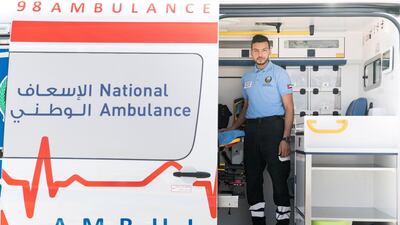For many, Ramadan is a time to scale back the working day. Not so for Mohammed Alshdaifat and the medics he leads at the National Ambulance service.
Car accidents and medical emergencies keep the team on the road 24-hours per day, weaving their way through busy iftar traffic to reach those in need.
The service's medical personnel attend back-to-back call-outs throughout the month, often running in the heat to and from their vehicles.
Even when on a break or breaking their fast, crews on shift always have to be ready.
“I always carry the mobile radio – it’s like part of my body," says the 27-year-old emergency medical technician (EMT) leader, who is from Jordan and based in Ras Al Khaimah.
"I carry it with me during iftar. Every second matters in our job.
“Receiving a report to dispatch to the scene carries with it many challenges, but I am trained to cope with such stress and challenges, even when I am fasting."
_______________
Ramadan 2018 series:
Sports in Ramadan: 'I'm tough with the guys and can yell in their faces' says superfit Emirati coach
Mosques of the UAE: 100-year-old place of worship has stood the test of time
Midnight in Ramadan: The radio station that comes alive at night
Ramadan business: How Middle East advertisers are making Ramadan their Super Bowl
_______________
On the first day of Ramadan, a few minutes after 7pm as Mohammed prepared to break his fast, he received an urgent call to respond to a fight.
"It was someone in need of urgent medical assistance due to a head injury. We rushed to the scene in the Al Refa’a area, and we provided him first aid treatment in the ambulance while on the way to the nearest hospital.
"After reaching the hospital and handing over the patient, I started looking for a glass of water to break my fast,” said Mr Alshdaifat.
“It’s always busy. Usually I plan my meals ahead and try to eat as healthy as possible and consume lots of fluids. I eat with other staff in the department or with friends. I do avoid having iftar alone."
Mohammed, a 27-year-old Jordanian, feels duty-bound to help those in need, particularly at this time of year.
Police issue widespread appeals for safe driving in Ramadan, but it can be dangerous time to be on the road.
Last year, six people died in accidents in Ramadan in Dubai alone, and a study of 1,650 accidents last year found most took place in the later morning rush hour between 10am and 11am, as staff on shorter hours head into work.

“One emergency we dealt this Ramadan was a group of ten people who were involved in a car accident on Sheikh Mohammed bin Zayed Road.
"They suffered from minor to moderate injuries. And most reports related to traffic accidents are received before iftar. After people break their fast, we receive reports about people suffering from stomach problems due to overeating."
Mohammed is no stranger to witnessing tragedy on the roads, often by drivers who could have avoided losing their lives.
“Failing to wear seatbelts causes severe injuries and I've seen the effects of not doing so," he says.
Away from the job, Mohammed tries to relax and to see friends.
"We plan iftar outings with friends living in Ras Al Khaimah. Sometimes we go to iftar tents and watch football games,” he says.
As with many expats, he misses his homeland at this time of year and family.
“Ramadan in Jordan is quite different. Every day of the month, my family members and I would be invited for iftar or invite a group of people – a lot of Iftar invitations,” he says.
But he now knows he is in the right place doing what he does best.
“I couldn’t ask for more when I see the patient is feeling better,” he says with earnest.

